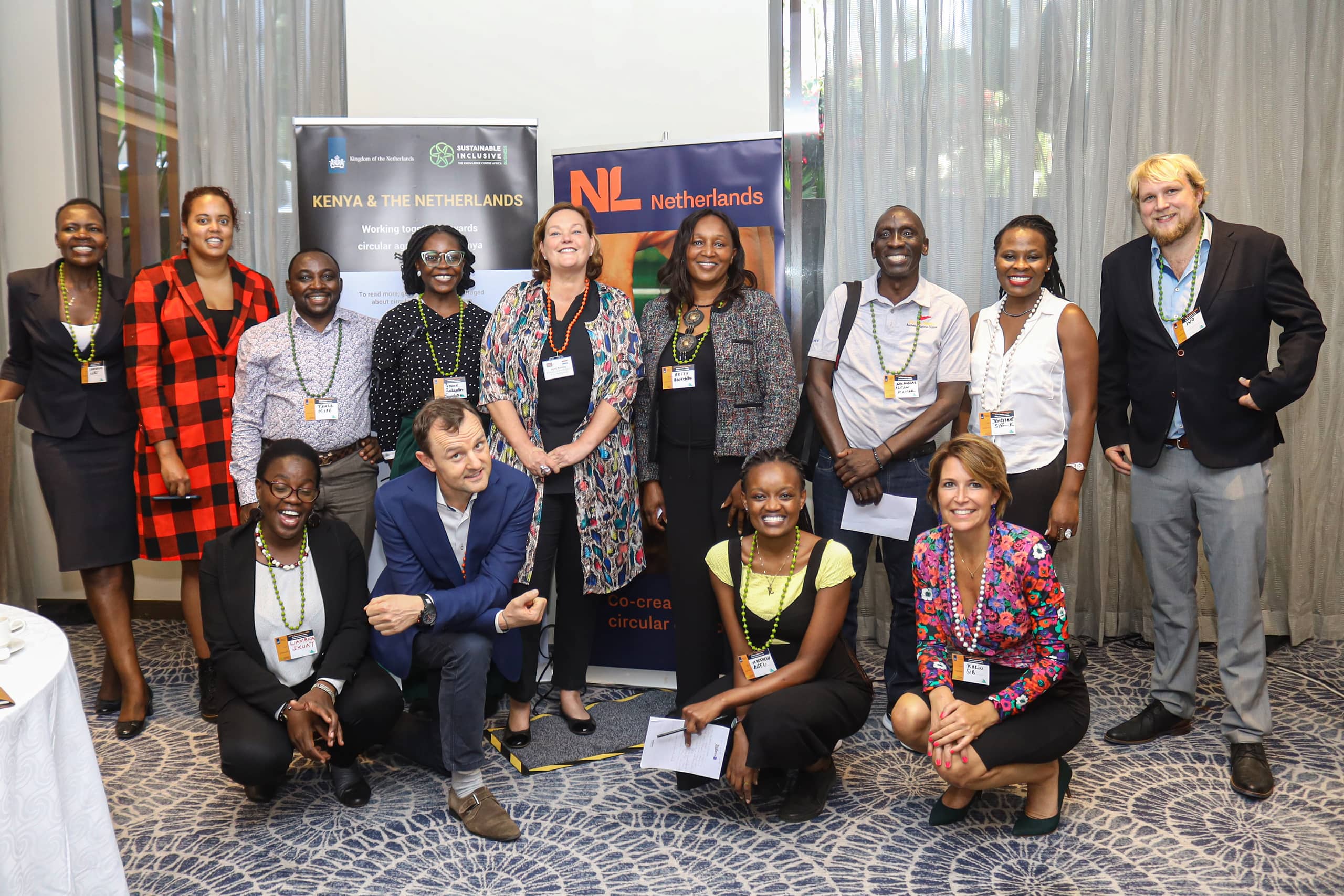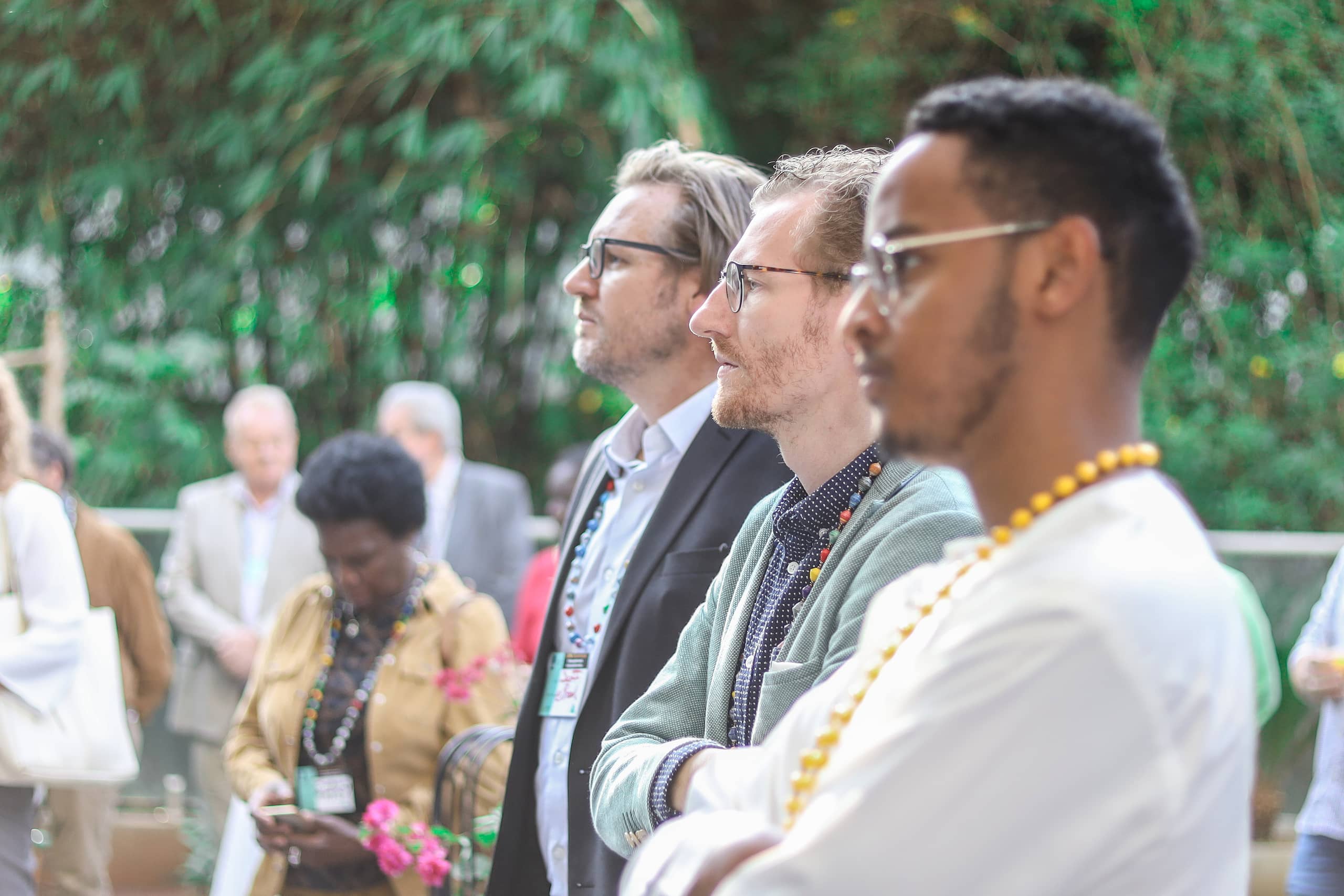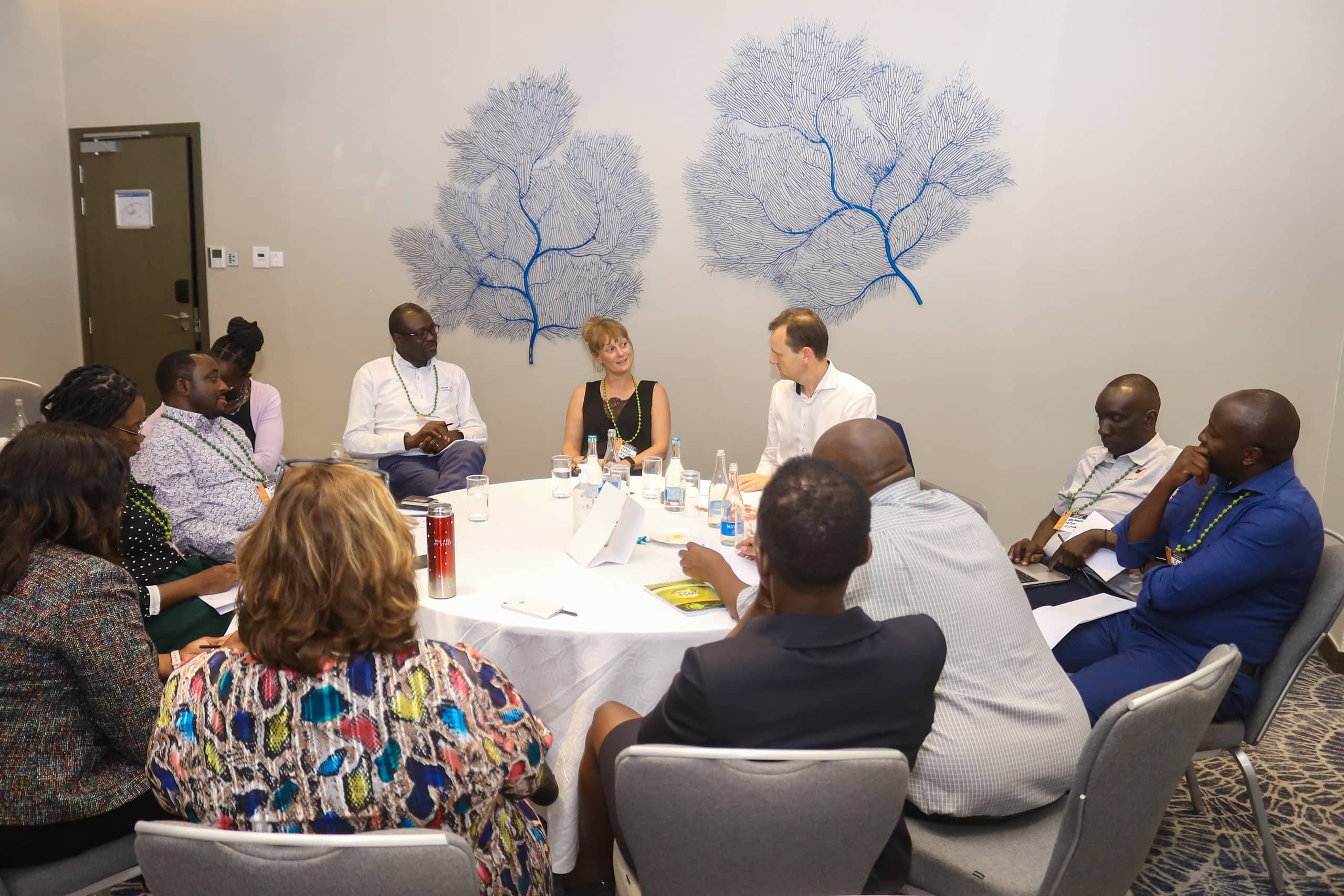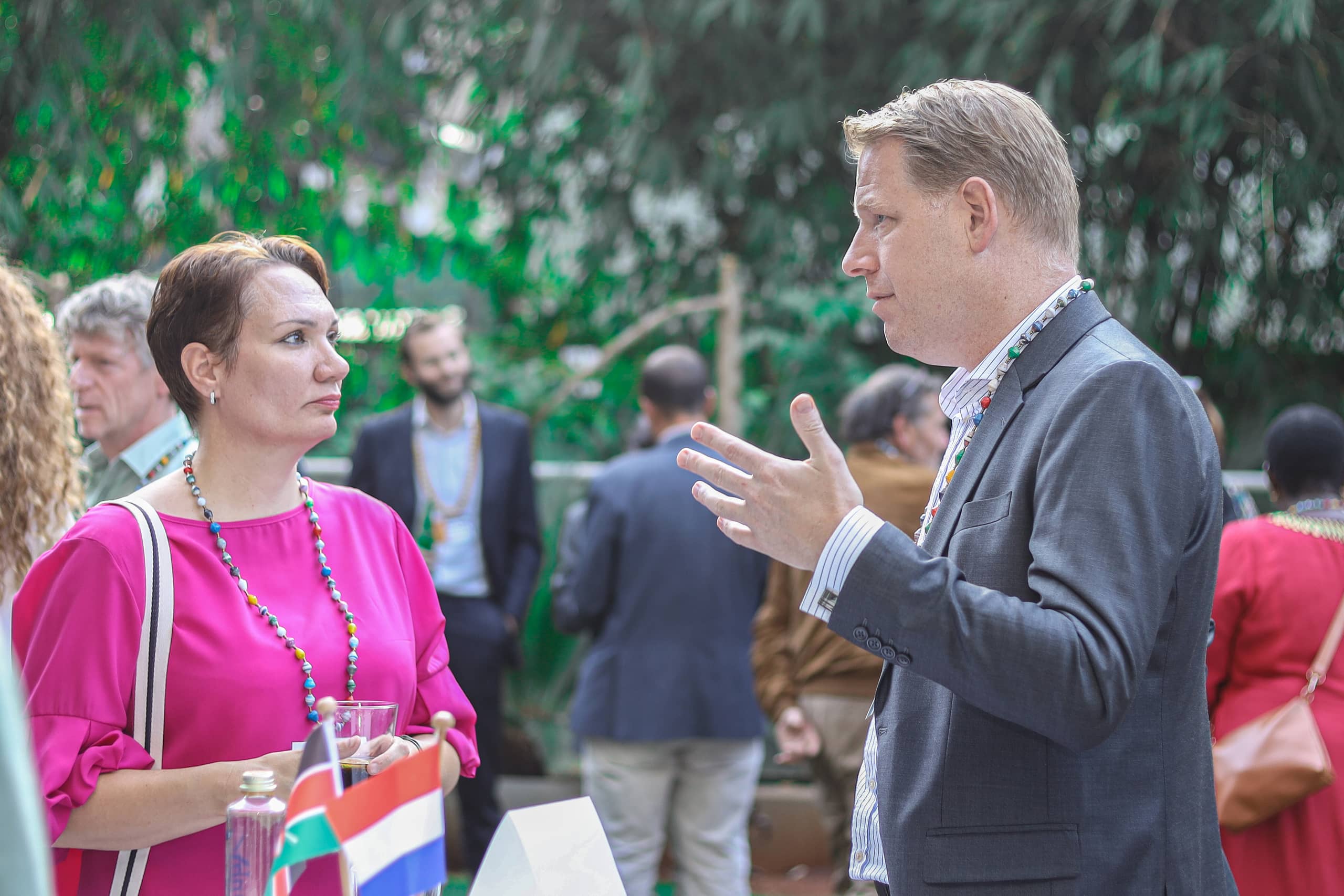By adopting increasingly circular, regenerative, and inclusive farming practices, Kenya has shown great potential to make its second-largest industry more sustainable overall. For instance, circular agriculture is enabling Kenya to mitigate climate change, elevate its food quality and improve security. To illustrate the opportunities for circular agriculture in Kenya, the Netherlands embassy released the brochure “Kenya and the Netherlands working together towards circular agriculture in Kenya”. The brochure provides a total of 11 farming trends and opportunities that have been identified as indicative of the transition towards circular agriculture. It includes a selection of best practices across five areas that we hope will inspire anyone working in the agricultural sector.
L-R: Ingrid Korving, Agricultural Counsellor for Kenya and Tanzania, Karin Boomsma, Director of Sustainable Inclusive Business – Kenya, Maarten Brouwer, The Netherlands Ambassador to Kenya, launching the report in Nairobi on Wednesday, 6th April.
Speaking during the launch, The Netherlands Ambassador to Kenya Maarten Brouwer noted that “In recent years, Kenya and the Netherlands worked together to optimize Kenya’s agriculture sector by offering smart technology and organizational support, which has already proven successful.”
To illustrate the opportunities for circular agriculture in Kenya, the Netherlands Embassy has released a report “Kenya and the Netherlands working together towards circular agriculture in Kenya”. The report provides a total of 11 farming trends and opportunities that have been identified as indicative of the transition towards circular agriculture. It includes a selection of best practices across five areas hoped to inspire anyone working in the agricultural sector.
The report was launched during a business network reception organized by the Netherlands Embassy in Nairobi on the 6th of April 2022.
Circular Agriculture
Kenya’s agricultural sector is vital for sustaining its people and its economy. With a rapidly growing population, the demand for nutritious foods is rising. In addition, at least a quarter of Kenya’s annual GDP is generated from agriculture, and it employs over 40% of its total working population. It is, therefore, safe to say that optimizing the agriculture sector would benefit the country in multiple ways. Moreover, it would help Kenya achieve its ambitious climate goals.
“This is where the concept of circular agriculture comes in. In simple terms, it involves practices that are in harmony with nature and at the same time support its stakeholders. Circular agriculture enables Kenya to tackle key environmental challenges while also sustaining its population and economy,” emphasized Karin Boomsma, Director of Sustainable Inclusive Business – Kenya.
So, how exactly is Kenya making its agriculture more sustainable? For one, adopting circular farming practices helps to mitigate climate risks like droughts and floods, it keeps the soil healthy and therefore, secures nutrition and avoids soil and land degradation. Circular, regenerative practices reduce carbon emissions thanks to efficient (re)use of resources. By turning produce that would otherwise be lost into animal feed, natural fertilizers, or biofuel, food waste is prevented, soil quality is elevated, and unnecessary emissions are reduced.
“Kenya’s agricultural advancements have seen a great number of collaborations with the Netherlands. Though having vastly different climates, both countries rely heavily on agriculture and are thus keen on exchanging experiences and best practices. As driving forces behind circular agriculture, our countries together form a rich source of knowledge that benefits both parties,” said Ingrid Korving, the Agricultural Counsellor for Kenya and Tanzania, adding that "the Netherlands Embassy has formulated five agriculture sectors that have already bloomed as a result of the partnership".
Impressions of the launching event on the 6th of April 2022
Animal Feed
One of these is centered on circular animal feed, with the Impact cluster FeedTech Kenya. In Kenya and the East African region as a whole, there is a growing demand for locally produced, protein-rich animal feed. The production is relatively easy, makes use of ‘waste materials’, solves waste issues and the low costs versus high protein value make it an ideal alternative for animal feed for the country and the world. Soy needed to produce animal feed is often imported from countries such as Brazil, which causes deforestation, loss of biodiversity, and high carbon emissions. Making animal feed more circular is one way to circumvent these risks.
This is how the ‘circular fly’ came into being. Researchers have discovered that the Black Soldier Fly, which is common in Kenya, can convert large amounts of organic waste into protein, which can then serve as a resource for animal feed. By breeding these insects and using them as organic waste processors, animal feed can be produced more circularly. On top of that, the by-products of this process can be used as fertilizers.
Beeld: Joost Bastmeijer
Talash Huijbers from Insectipro (a business producing Black Soldier Flies for animal feed) says: "My business contributes to the reduction of animal feed prices, gives local farmers the ability to produce local fish, and chickens, which feed on good quality protein (BSF) in turn producing higher quality meat and eggs and thus creating a higher nutritional value. This helps solve food security in Kenya".
Innovations like the above are already being adopted to further increase the circularity of Kenya’s agriculture. The brochure provides a total of 11 farming trends and opportunities that have been identified as indicative of the transition towards circular agriculture. Also, it includes a selection of best practices across five areas that we hope will inspire anyone working in the agricultural sector. The report was executed by Sustainable Inclusive Business.
Kindly find the full report here.
For more information on the brochure you can contact: Karin Boomsma – karin@sustainableinclusivebusiness.org. For more information on the impact cluster animal feed you can contact Iris Boom at iris.boom@larive.com.
Would you like to learn more about our activities or do you have any questions? Please send an email to nai-lnv@minbuza.nl. We give regular updates on developments in the agriculture sector in Kenya on this website and on our Twitter @NLAgriKenya.



